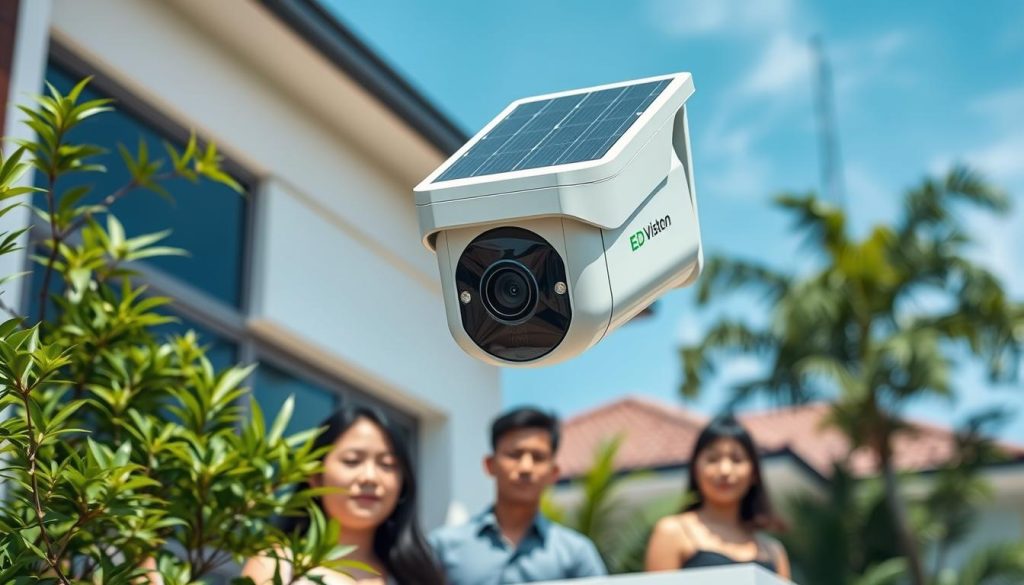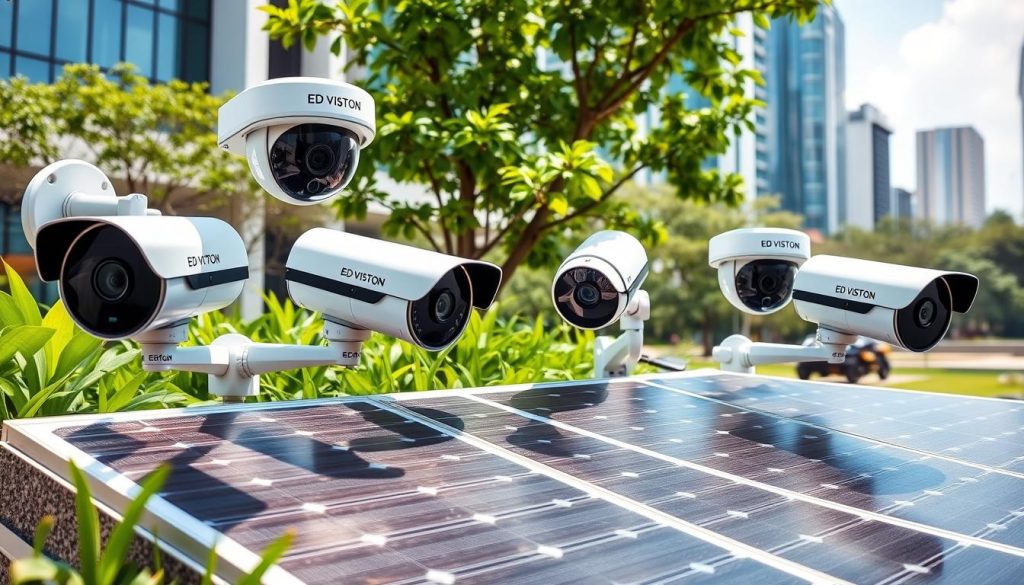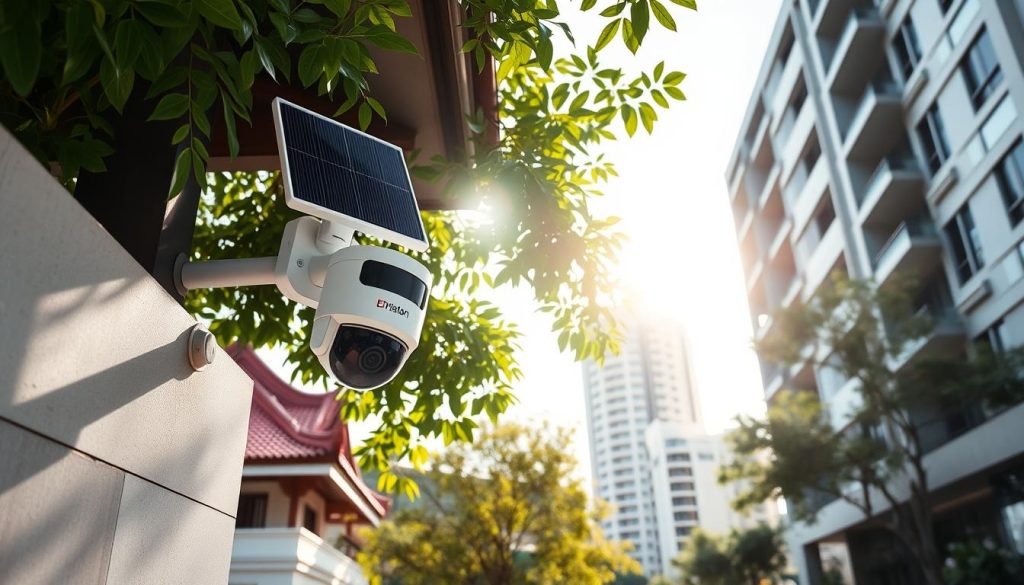In today’s world, safety and energy costs are big concerns. Solar battery security cameras offer a great solution. They combine green tech with top-notch surveillance, perfect for homes in Singapore.
These cameras keep an eye on your place and save energy. They cut down on the need for old power sources. This means big savings on your energy bills.
By choosing solar, you get better security and help the planet. Costs for setting up these systems can cut your energy bills by up to 75%. It’s a smart move for your home and the environment.
If you want to boost your home’s security, now’s the time. Contact ED Viston at +65 8313 4578 to explore the latest options and deals.
Key Takeaways
- Solar battery security cameras can operate for up to 7 days without sunlight.
- Installation costs can reduce monthly energy costs by up to 75%.
- Regular maintenance can extend the life of solar cameras to approximately 10 years.
- Cameras with Full HD resolutions promote better detail identification.
- Models rated IP66 or higher ensure durability against adverse weather conditions.
- Most solar cameras support remote access and provide immediate alerts.
- Easy installation offers a hassle-free alternative to wired systems.
Introduction to Solar-Powered Security Cameras
Solar-powered security cameras are a big step forward in surveillance tech. They use sunlight as energy, so they don’t need regular power. This makes them great for places where it’s hard to get electricity.
In sunny places like Singapore, these cameras work well all year. They’re perfect for keeping an eye on things outside.
But, how well they work depends on the sun. Places with lots of clouds might not get the best results. Anchorage, for example, has a lot of cloudy days, which affects solar cameras.
Despite this, solar cameras are designed to work well in different conditions. They can see up to 20 meters at night, thanks to special sensors. These cameras are also good for the planet, making them popular with those who care about the environment.
Benefits of Using a Solar Battery Security Camera
Solar battery security cameras are a smart choice for better surveillance and being eco-friendly. They use less energy, fitting well with sustainable home security. This makes them great for those in Singapore who care about safety and the planet.
Eco-Friendly and Sustainable Monitoring
These cameras use the sun’s power, reducing the need for fossil fuels. This cuts down on harmful emissions. It helps homeowners support green efforts and live more sustainably.
Cost Savings Compared to Traditional Systems
Choosing solar battery security cameras can save you money. While they might cost more upfront, they save you money over time. Traditional systems can cost $200-$500 a year for electricity and upkeep.
Solar systems don’t have these ongoing costs. They can be set up quickly, saving you money and time.
| Aspect | Solar Battery Security Cameras | Traditional Security Systems |
|---|---|---|
| Initial Setup Costs | Higher, but offset by long-term savings | Lower, but with ongoing costs |
| Energy Costs | No monthly fees, savings up to 75% | Monthly utility costs |
| Maintenance | Minimal, lower lifetime costs | $200-$500 annually |
| Installation Time | Minutes | Weeks |
Solar battery security cameras are a smart, cost-effective choice. They offer a new way to protect your home. For more information, visit this resource.
What is a Solar Battery Security Camera?
A solar battery security camera is a smart device. It has a solar panel, a rechargeable battery, and a high-definition camera. This makes it a self-sufficient monitoring system.
These cameras are great because they don’t need a constant power source. They work well in places where power is hard to find. They use sunlight to keep watching all the time.
Knowing what features of solar battery cameras are important helps a lot. They need 6 to 8 hours of sunlight to work best. The solar panels turn sunlight into energy.
The cameras use lithium-ion batteries, which last a long time. They can keep watching day and night, all year round.
Solar battery security tech is good for the planet and easy to set up. You don’t need a lot of wiring or help from experts. It’s perfect for watching over remote areas or RVs.
Want to learn more about solar cameras for your security? Check out this in-depth guide.
Features of Solar Battery Security Cameras
Solar battery security cameras have unique features that make them great for homes and businesses. They help keep an eye on things while being kind to the planet.
Battery Life and Solar Charging Capabilities
The battery life of solar battery security cameras is key. They use rechargeable lithium batteries that last months with enough sunlight. Even when it’s cloudy, these cameras keep working thanks to solar power.
Many can run for up to seven days without sunlight. This means you can count on them for security, day or night.
Resolution and Video Quality Assurance
Good video quality is essential for solar cameras. They start at 4 MP and can go up to 1080p or more. This means you get clear pictures, day or night.
They also have night vision. You can choose to see everything in color or black and white. This makes sure you can see every detail, even in the dark.
Weather Resistance and Durability Ratings
Solar battery security cameras are built to last. They have tough, waterproof cases with IP66 ratings. This means they can handle rain, dust, and extreme temperatures.
In places like Singapore, this is very important. It ensures they work well no matter the weather. Their durability makes them perfect for outdoor use.

Power Requirements for Your Solar Security Camera
It’s important to know how much power solar cameras use. They usually need between 4 to 15 watts. This depends on their features and how often you use them.
For your camera to work well, it needs enough energy for about 8 hours a day. You’ll need a battery that can hold at least 10 times the solar panel’s power. This prevents the battery from getting too full. The battery can last from a week to over three months, depending on use.
Charging times for solar camera batteries are usually 6 to 8 hours. Choosing the right solar power supply is key for constant use. Using top-notch batteries that can recharge with solar energy can also cut down on utility bills all year.
| Camera Type | Power Consumption (W) | Battery Capacity (Ah) | Recommended Solar Panel (W) | Charging Time (hrs) |
|---|---|---|---|---|
| Standard Camera | 4-10 | 10-15 | 20-30 | 6-8 |
| High-Resolution (1080p) | 10-15 | 15-20 | 30-40 | 6-8 |
| PTZ Camera | 10-20 | 20-30 | 40-60 | 8-10 |
For setups with many cameras, add 1.3 times the power needs for peak use. Make sure your solar power supply meets these needs. This ensures your security system works well and reliably.
Choosing the Right Battery for Your Solar Camera Setup
Choosing the right battery for solar cameras is key for top performance. There are two main types: Lead Acid and Lithium-Ion. Each has its own benefits and drawbacks that affect your choice.
Lithium-Ion batteries are popular for lasting over 15 years with care. They can use up to 80% to 90% of their energy, unlike Lead Acid’s 50%. This makes Lithium-Ion better for solar cameras.
Lithium-Ion batteries also last longer, with over 2,000 cycles. Lead Acid batteries only last about 500 cycles. This means Lithium-Ion is more cost-effective and reliable over time.
Modern Lithium-Ion batteries charge well even in partial sunlight. They work well in cold weather too, unlike Lead Acid. Their light weight makes them easy to move and set up, great for portable systems.
| Battery Type | Average Lifespan | Depth of Discharge (DoD) | Cycle Life | Performance in Cold |
|---|---|---|---|---|
| Lithium-Ion | 15 years | 80%–90% | 2,000+ | Excellent |
| Lead Acid | 5-7 years | 50% | 500 | Poor |
When picking a battery, think about your setup’s environment. Temperature and sunlight matter. The right battery choice boosts your solar camera’s performance, longevity, and efficiency.
Installation Process of Solar Panel with Battery for Security Camera
Setting up a solar camera system requires careful planning. Start by picking the best spots for installation. Look for areas that get 5-6 hours of direct sunlight each day. This ensures your system works well, even when sunlight is scarce.
When setting up solar cameras, think about the solar panel’s position. The right angle can boost energy efficiency by 25%. Make sure the panels face the equator and are free from shadows. This can save you 50-70% on your electricity bills over time.
Here are key steps for a DIY solar installation:
- Choose the right hardware to hold the solar panel in place.
- Connect the solar panel to the battery, making sure the connections are correct.
- Connect your security camera to the power source, following the manufacturer’s instructions.
- Use an app for remote monitoring, which 80% of users find helpful.
After setting everything up, check if the system works as expected. Solar security cameras use rechargeable batteries that can last 1 to 3 days without sunlight. Knowing how much power your camera needs is important. Make sure the system can handle it.
Also, consider local benefits for solar installations. In Singapore, you might get government help that covers up to 30% of the costs. This makes solar power a smart choice for your wallet and the planet.
| Feature | Details |
|---|---|
| Optimal Sunlight Exposure | 5-6 hours daily |
| Energy Savings | 50-70% on electricity bills |
| Battery Lifespan | 1-3 days without sunlight |
| Panel Efficiency | Up to 25% with proper positioning |
| Government Incentives | Up to 30% cost coverage in Singapore |
Best Solar Battery Security Cameras on the Market
Choosing the right solar battery security camera can be tough. The market offers many top-rated solar security products. Each has special features for different needs. It’s important to pick a camera that’s reliable, efficient, and of high quality.
Leading Brands and Models Available
Here are some top solar battery security cameras for 2024. They vary in features and price:
| Model | Resolution | Special Features | Price Range |
|---|---|---|---|
| Ring Spotlight Cam Pro | 1080p | Best value-for-money | $$ |
| Reolink Argus 3 Pro | 2K (2560×1440) | Runner-up for best solar camera | $$$ |
| Eufy Cam 3 | 4K | Best mid-range option | $$$ |
| Blink Outdoor | 720p | Most cost-effective | $ |
| Arlo Pro 4 | 2K | Cost-effective cloud storage | $$$$ |
Brands like Ring, Reolink, and Eufy are leaders in solar cameras. They offer features like color night vision and 24/7 color imaging. These cameras also have two-way audio and smart home integration.
Each model meets different needs, from being affordable to high-end. This makes it easier to find the right solar-powered security solution.

Optimal Placement for Solar Battery Security Cameras
Finding the right spots for solar battery security cameras is key. It boosts their power and reach. The goal is to catch the most sunlight and watch important parts of your property.
Things like trees or buildings can block sunlight. So, cameras need to be placed where they can see everything clearly.
Cameras should be about 8 to 10 feet off the ground. This height is perfect for seeing everything and keeps them safe from tampering. They should watch all ground-floor doors and windows, as burglars often go there first.
Places like living rooms and kitchens are also important. They get a lot of visitors.
- Secure outdoor camera locations, such as along driveways, monitor pathways burglars often use to reach front doors.
- Ensure solar panels are mounted at an optimal angle of 30 to 45 degrees to enhance solar energy capture throughout the year.
- Regular maintenance through periodic checks, including cleaning solar panels to remove dirt, will help maintain efficiency and performance.
Outdoor cameras need to be tough to handle the weather. Choose ones with good IP ratings for lasting longer. Also, think about how Wi-Fi cameras might slow down your internet. Using a separate router for them can help.
By following these tips, solar security systems work better, even when the power is out. The right spots for cameras mean better watching and more safety. This keeps your stuff safe from thieves.
Understanding Solar Panel Ratings and Selection
Choosing the right solar panels is key for the best performance of solar battery security cameras. Knowing solar panel ratings explained helps users make smart choices. These ratings show how well the panels work and how much power they produce, affecting the system’s success.
When selecting solar panels, think about these factors:
- Efficiency Rating: Solar panels usually work at 15-20% efficiency. Higher efficiency means more power in less space.
- Power Output: A 1 kW setup can make up to 850 kWh a year. It’s important to match the panel’s power to the camera’s needs.
- Geographic Location: Where you live affects how well the panels work. Places with more sun get better results.
Some security cameras need up to 40 watts. It’s important to pick a solar panel that can handle this. A 40W panel with a 15Ah battery can charge in about 7.5 hours. It can power the camera for around 15 hours, even on cloudy days.
The solar energy market is growing fast, expected to hit over 1,888 GW by 2027. Knowing solar efficiency ratings is key for buyers. Solar panels cost between $2.50 and $3.50 per watt. While they cost more upfront, they can save money in the long run.
| Factor | Description |
|---|---|
| Efficiency Rating | Solar panels operate at 15-20% efficiency, influencing electricity generation capacity. |
| Power Output | Panels can produce 850 kWh/year with 1 kW installation for energy needs. |
| Power Consumption | Security cameras can consume up to 40 watts; panel output must meet this requirement. |
| Cost | Prices range from $2.50 to $3.50 per watt, affecting the overall investment. |
Keeping the system well-maintained is important. It helps the solar panels last longer and work better. Making smart choices about solar panel ratings is key for good solar security solutions.
Wiring and Connecting Your Solar Security Camera
Setting up your solar camera right is key for its best performance. It starts with knowing how to connect your solar security system. This is simpler than traditional setups, saving money and improving energy use.
When setting up, place the solar panel at a 30-degree angle for the best sunlight. Cleaning the panel can boost power by up to 20%. Also, mounting your camera high can protect it from tampering and vandalism.
Choosing the right wiring is also important. Outdoor cameras usually run on 12V or 24V. These systems need little upkeep, making them great for long-term surveillance. Following the right wiring and connection practices can help you get the most out of your solar-powered CCTV.
FAQ
What is a solar battery security camera?
How does a solar powered security camera work?
What are the benefits of using solar battery security cameras?
Are solar powered security cameras weather-resistant?
How do I choose the right battery for my solar security camera?
What is the installation process for solar battery security cameras?
What are some top-rated solar battery security cameras available in the market?
How do I ensure optimal placement for my solar battery security camera?
What should I know about solar panel ratings and efficiency?
What are the best practices for wiring and connecting solar security cameras?
Source Links
- https://wenhong.com.sg/solar-battery-security-cameras-secure-eco-friendly/
- https://sgcctv.com.sg/solar-powered-battery-cctv-ccsolarc3b/?srsltid=AfmBOorZTcOC7WdAA7va8_-8dkLWD-odtYmq9ZeWCvS5GbvkgJhzDGFi
- https://www.instructables.com/How-to-Solar-Power-Your-Home-Security-Camera/
- https://www.deepsentinel.com/blogs/home-security/solar-powered-security-cameras/?srsltid=AfmBOoqLKCzrI99GP-TzefdBE5htBJ3DfU8FkxRIhedtLOmER4DJPESA
- https://xegatech.com/blogs/news/solar-powered-security-cameras?srsltid=AfmBOoqBPjvXL1fOoapWyALxFtL2Okb1qUPTrXNd2Z52TWEApxtDl_NL
- https://www.lvt.com/blog/7-advantages-of-installing-a-solar-powered-security-system
- https://www.lvt.com/blog/comparing-solar-powered-security-units-traditional-security-systems
- https://ucocare.net/blogs/blog/the-pros-and-cons-of-solar-security-cameras
- https://wenhong.com.sg/solar-panel-with-battery-for-security-camera-guide/
- https://blog.arlo.com/best-security-setups/3-reasons-to-choose-a-solar-powered-security-camera/
- https://www.deepsentinel.com/blogs/home-security/solar-powered-security-cameras/?srsltid=AfmBOorit-kGFnR4s0WF2yMsorv8fwFqxgLm1xIlHDfI6RIlJY6rPyTK
- https://www.lsvisionsolar.com/guide-and-key-features-of-solar-powered-video-surveillance-cameras/
- https://wenhong.com.sg/solar-powered-lte-security-camera-singapore-guide/
- https://www.lsvisionsolar.com/what-to-consider-when-buying-a-solar-security-camera/
- https://ajax.systems/blog/security-camera-power-supplies/
- https://www.ufinebattery.com/blog/choosing-the-best-lightweight-solar-battery-for-your-needs/
- https://www.lsvisionhd.com/how-to-choose-a-suitable-solar-camera/
- https://www.kentfaith.co.uk/blog/article_how-to-install-solar-camera_1794?srsltid=AfmBOooC_nugoj6UJNJ2CxRdRzZgpKmYl60WK9hnORBdD3u__Kz-CHy1
- https://www.airlink-ilife.com/solar-pack-set-airs20
- https://www.spottersecurity.com/blog/solar-powered-security-cameras-2024/
- https://www.hikvision.com/sg/products/IP-Products/Network-Cameras/solar-powered-security-camera-setup/
- https://anran-cctv.com/blogs/news/solar-security-camera-installation-guide?srsltid=AfmBOorMshDygrHkCKFheGeRpJEpE4ZyCRJVZ4mJpp2mBOOyH8CQdsX6
- https://www.security.org/security-cameras/placement-guide/
- https://www.linkedin.com/pulse/solar-panels-security-cameras-buyers-guide-d5ehf
- https://upcomingsecurity.co.uk/security-guides/cctv-camera-guides/how-solar-cameras-work/
- https://www.lsvisionhd.com/how-to-install-solar-cctv-camera/
- https://reolink.com/blog/solar-power-wireless-security-cameras/?srsltid=AfmBOorBCEdsVexzV3e2wD9lJGGCbq4ysrlossDO0lfn4RHa_MMCtXrk

